- Home
- Deborah Smith
More Sweet Tea Page 2
More Sweet Tea Read online
Page 2
But I couldn’t help it. I had to go to sleep.
WHEN I WOKE up again, it was morning and the air was wet with the scent of cut grass and gasoline. Someone was mowing somewhere in the neighborhood. I was on the floor below the window and Great Aunt Sophie’s pink polyester bedspread was again covering me. I sat up and looked around. I could hear voices coming from outside so I crawled to the window and looked out. Great Aunt Sophie was down in her rose garden, and my mom was hanging her favorite green and white striped bedsheets on the clothesline in our backyard. They were talking to each other, calling back and forth like they did almost every sunny day when there was outdoor work to be done.
“Mom!” I yelled.
Both she and Great Aunt Sophie turned at the sound of my voice. Mom smiled up at me. “Come over here and give me a hug, sweetie girl,” she called.
And I was out of the house in nothing flat.
I ran right past Great Aunt Sophie and over to my mother. As I hugged her, I grabbed her shirt tight in my fists as if she would fly away if I let go, as if I’d caught her just in time. She bent down and kissed the top of my head. She was fine, the way all Southern ladies were fine, as if there were no hurts great enough to break them. But I knew there were, and I held her tighter.
Great Aunt Sophie watched us, her hand shielding her eyes from the sun. She stood there for a long time. Finally, she lowered her hand and picked up her basket of roses. She walked back to her house and her ghost there, and Mom and I held hands and walked slowly together to our house to greet ours.
Hair Today, Gone Tomorrow
by
Maureen Hardegree
“It’s hard for me to get used to these changing times. I can remember when the air was clean and sex was dirty.”
—George Burns
I’VE LIVED a good life, and I’ve seen a lot of change in the eighty-seven years I’ve been in this world. Some changes have been first rate, like the cordless phone and the paper sack. I bet you don’t know too many women who can remember when the paper sack was invented. But I have to tell you, not all change is good.
Take hairdressers, for example. I can guarantee losing a hairdresser is one of the worst things that can happen to a woman, worse even than hot flashes. I know this for a fact. I’ve lost several to retirement, one to a divorce, and two to arthritis. But I hadn’t ever lost one to the cemetery until last week.
And if you don’t think that’s bad, then maybe you can tell me how the H—E—double—L a town full of old women is supposed to get their hair done for a funeral when the only hairdresser in town who knows how to fix hair right is the one they’re going to see buried. It’s what you might call a real predicament.
That’s what I was trying to figure out last week at breakfast right after Geneva called to inform me of the blow fate had dealt to the old women of Mayburn.
The smell of sausage and biscuits hung in the air as I took my first bite. I nearly choked when my phone rang. I checked the clock on the wall, then my wristwatch with the big numbers my grandson gave me because my eyesight’s so poor these days. It wasn’t but ten after eight. Who could be calling me so early in the morning? I hadn’t even had time to read the obituaries yet.
“I’m coming, I’m coming,” I said to the phone, annoyed because everyone knows there’s nothing worse than a cold biscuit. I went to the bedroom off my kitchen. That was where my cordless phone was sleeping in its cradle.
“Hello?” I said, hoping it wasn’t one of those salespeople. My grandson put me on the national “don’t call me” list, so it should be someone I knew.
“Lucille, it’s Geneva. I’ve got terrible news.” My across-the-street neighbor’s voice crackled over the phone. For Geneva, terrible news could be weevils in her cold cereal, so I didn’t get all excited.
I walked over to the front room and peeked out my dusty Venetian blinds. Geneva was standing by her picture window and looking at my house. She had every light in that building lit, wasting money. Now me, I like to keep my light bill low.
“What kind of terrible news?” I shouted.
“Have you read the obituaries yet?”
“No.”
“Then go do it, right now.”
My heart raced in my chest, and my head got a little swimmy, so I walked back to the kitchen table and sat down. One thing I don’t do is go all to pieces, but I had a head cold today and got a little teary-eyed. I flipped to the page of the Mayburn Times listing all the deaths.
The first one was a full-blown article about a teenager driving too fast, who killed himself smacking into a tree. “Now that’s a downright shame,” I said. “That boy’s family must be a mess about now. It’s a terrible thing when your kids go before you do.” I knew the truth of what I said because I’d lived it.
The family’s last name wasn’t familiar. He must not have grown up around these parts—sounded kind of Yankee, if you asked me. And they lived in one of those new subdivisions popping up all over town.
“No, no,” Geneva fussed. “Look at the last one.”
“Don’t get your drawers in a wad. I’m getting there.” My eyes scanned down, and I saw what had her so upset. Pearl Malcolm was dead.
“That can’t be,” I said, more to myself than to Geneva. I’d seen Pearl in the market the other day, and I should’ve told her she looked like she was ailing, but I hadn’t because it just wouldn’t have been polite. We’d talked about me needing a permanent.
She’d told me to come over around eight o’clock Saturday morning, her first appointment of the day. Looked like I wouldn’t be going now.
“It’s true enough.” Geneva harrumphed. “The paper don’t say it, but Pearl knew something was wrong. Lida was having her hair fixed, and she could tell Pearl was feeling puny. Lida called Pearl’s daughter, Mary Clare, the one who works at that fancy hairdresser in the strip mall . . .”
You could say Mary Clare had followed in her mama’s footsteps if not scissor hands.
“Well, Mary Clare was trying to get Pearl to leave and go to the ‘mergency room in Monroe,” Geneva said, and took a breath, “but Pearl wouldn’t listen. She told Mary Clare she wasn’t leaving until everybody’s appointment was taken care of.”
“Says here she had a heart attack.” Of course, it didn’t say right out that she had a heart attack. That wasn’t done. But it did say she “died suddenly,” and we all knew what that meant. If it had said she died after a prolonged illness, we’d have known it was cancer. And if it said someone died “unexpectedly,” well, we’d pray for the family. “Unexpectedly” meant suicide.
“Lordy, lordy, that’s not the half of it. Lida told Essie Mae Walton that once Pearl was ready to go to the hospital, she caught sight of herself in the mirror. She started trimming her bangs. I guess she was worried about them doctors seeing her hair shaggy, her being a hairdresser and all. About half-way through cutting them, she fell out.”
“She dropped dead right there?”
“Don’t you know it. The worst part is that she’s got a chunk of hair missing at the center of her forehead, looks just like a kindergartener who got hold of her first pair of scissors. I don’t know who Mr. Bowden’s gonna get to fix her for the viewin’.”
I didn’t know who was going to fix my hair, either. Then I felt badly for thinking it.
“That’s terrible,” I agreed. “Just plain terrible.”
“Don’t you know it,” Geneva said. “And I’d like to know who’s gonna do our hair for the viewin’ and the funeral? I ain’t goin’ to that hoity-toity place where Mary Clare works. I hear there’s a man there. Calls hisself a stylist.”
“I don’t mean to be ugly, but you shouldn’t be worrying about your hair at a time like this, Geneva.” Good thing she didn’t have the gift of reading minds.
Pearl, bless her heart, had been
a good woman, and I’d miss her. You could say we were friends of sorts. Women are close to their hairdressers; it’s a fact of life. We tell hairdressers some stuff we don’t even tell our families. Hairdressers know all about your kids, and your grandkids, and if you’ve lived as long as me, even your great-grandkids.
She had a small beauty parlor in a converted garage. She always did let me have the first appointment of the day because I didn’t like to wait. It made me nervous. Her poodle Jezebel was always wanting to sit in my lap, and I’d learned to tolerate it. Never did understand treating dogs like babies, but then there were a lot of things in this world I didn’t understand like why people were against the truckers. Trucks were how we got our food. People forgot that.
I hung up with Geneva, and I hated to admit it, but when I set the phone back in its cradle, I took a look at my hair in the mirror. It was a flat out mess. I’d been due for a perm for over a month, but I’d put it off.
I checked my calendar and right smack dab on Saturday was my appointment to have my perm. I couldn’t show up to the viewing with my hair all flat; it wasn’t respectful—especially when the person who was dead made her living fixing people’s hair. I was going to have to figure out something fast, as would the rest of the town’s over-seventy crowd.
What in the world was Geneva going to do? Pearl was the only hairdresser in three counties who knew what a finger wave was, much less how to do one.
Maybe a hat would work. I knew I must have some from years ago. I don’t throw much away. You never know when you might need it.
I went to my wardrobe and looked in the drawers. The only things I saw were lots of underwear that were too big since I started falling off. I didn’t eat much these days. And the dress, slip, and nylons I’m going to wear to my funeral were in the second drawer I checked. I showed them to my grandson’s wife the last time she visited, so she’d know where everything was, and she agreed my outfit was right pretty.
Suffice to say, I couldn’t find one of my old hats to save my life. I must have put them up in the attic, and I wasn’t going up there. I like to have killed myself tottering on the ladder last time I tried, and my grandson made me promise not to do it anymore.
I wasn’t supposed to rake leaves from the hateful tree out back, either, but I did it anyway. I figured minding about the attic was good enough to suit him.
I realized I was going to have to buy a hat to cover up my hair, and that would mean a trip to the mall with my sister Carolyn, who I’d raised like she was my own.
That was one of those changes that was nowhere as good as a paper sack—shopping malls. The only stores we got left in what people in Atlanta called our “quaint” town were restaurants and antique stores, and not one of them had a hat I could wear to Pearl’s viewing.
WHILE CAROLYN tried to find a parking space near one of the entrances, I counted my cash. I don’t buy a thing on credit. If you want something, you save up for it.
Two hundred dollars. Plenty and then some. I removed a twenty and secured my wad of bills with my rubber band and slipped it back into the special zippered compartment of my pocket book. You never know when you might have an emergency like a flat tire and need some cash money to have it fixed. I believe in being prepared.
Carolyn parked the car as close to the Rich’s entrance as she could get. I know about how Macy’s bought them, but I refuse to call the store anything else. Anyway, the entrance looked to be about a mile away from where she parked.
Once we got inside the store, Carolyn walked me over to some hats. They were all sports caps like the kind my grandson likes to wear. I supposed I could wear a Braves cap since Pearl was such a fan. She’d always had the game on during baseball season.
A nice man pointed us to where the ladies’ hats were, on the other side of the brightly lit center of the store where they sell all that perfume, jewelry, and make-up.
I’d read about fraternity boys and midshipmen having to run the gauntlet when being hazed, and I felt like I was right there with them as Carolyn and I tried to cross that slippery marble floor and avoid the pretty women in chiffon scarves shoving perfume-squirted cards into our hands. Girls in white doctor coats offered to give us makeovers.
“I’m just here to buy a hat,” I said and placed the perfume cards on a nearby glass counter; they were stopping up my head.
When we made it to the ladies’ hats section, wouldn’t you know, I couldn’t find but one black hat among all they had for sale.
Carolyn made me try it on. “Let me see, dahlin’.” She clapped her hands together. “Now don’t you look pretty.”
I stared in the mirror. “What I look like is ridiculous. No one wants to see an old, pasty-faced woman in wide-brimmed black hat that belongs on some movie starlet from the 1940’s.”
A very nice saleslady, who favored the Stanton family, came over to help us.
“Are you related to the Stantons?” I asked.
She frowned slightly as she searched the hat stands for something that would work for a funeral. “I don’t know. “
“Who’s your mama’s people?” I asked.
“Her last name was Inman before she married my daddy. Betty Inman.”
“Betty Inman?” I pondered that name for a minute. “Is she the younger sister of Margaret Inman?”
The saleslady blinked. “How did you know?”
“All right now, my mind is going back. Your mama’s grandmother was a Stanton. She went to the music school with my mama.”
The saleslady didn’t seem impressed, but then she pulled out a straw hat with a wide black ribbon around the crown. “Straw is very in this spring,” she said.
“It won’t go with my black pant suit,” I said.
Now pants for women was a change I had taken to readily. If I didn’t have to show my chubby legs in a pair of nylons, I wasn’t going to.
But the salesgirl, who looked like a Stanton if I ever did see one, wanted me to try on the silly hat anyway. And Carolyn wanted to see me in it as well. I knew it was a bad idea, but I put it on purely out of politeness.
I looked like Bette Davis in that Baby Jane movie.
“No, thank you,” I said.
“But, honey, what’re you gonna do?” Carolyn asked. “The viewing is less than twenty-four hours away.”
“Well, I’m sure as H—E—double—L not gonna wear this damn hat,” I said.
THE NEXT morning, the morning of the viewing I might add, Carolyn carted me off to that strip mall hairdresser’s shop where Pearl’s daughter Mary Clare worked. A sign in the window said “Walk-ins Welcome.”
I saw some of the women coming out and told Carolyn I thought this was a bad idea. I pointed at the one whose hair was sticking out every which way, like she’d just rolled out of bed and stuck her finger in the light socket. The woman following her had hair straight as a board and parted down the middle.
Women today don’t know how to fix their hair. The styles are just plain ugly.
“Now, you’re going in, Lucille. Everything’s gonna be all right, doll, you’ll see.”
A big sign hanging down from the ceiling tiles above the cash register listed prices for everything but what I wanted. Waxing, pedicures, manicures, massages. Where were the words wash and set?
“It’s too expensive,” I whispered to Carolyn.
“Hush,” she said. “What would Pearl think?”
“How can I help you?” asked a girl with short, spiky, bleached-blond hair.
I didn’t answer at first because there was a piece of something hanging under her lip. It winked in the light like an earring. Now that’s a change I’ll never understand. Why in the world do young people want to stick earrings in places they don’t belong? If God had meant for us to have holes all over our bodies, he would’ve made us that way.
“M
a’am,” she said, and the earring bobbed.
“I need to get my hair done.”
“So a cut and blow dry?”
“I don’t want no blow dry, that’s what makes women’s hair look so bad today.” I craned my neck to see past the front counter. “Haven’t you got any real hairdryers?”
Carolyn stepped up to the counter. “Lucille just wants her hair fixed, dahlin’. You know, maybe a little trim and set in curlers.”
“Yes, ma’am. We’ll fit her in as soon as we can. It’ll be about fifteen minutes’ wait before we have someone free.”
“Their sign says walk-ins welcome,” I mumbled under my breath. I don’t like waiting; it makes me nervous. The viewing started at four o’clock. It was eleven, now.
I don’t guess the girl heard me because right about then Mary Clare walked in. Her eyes were red from crying. She’s a pretty woman, looks a lot like Reba McEntire.
Mary Clare’s been divorced twice. And when she was over at her mama’s, she was always suggesting her mama’s customers update their look. She meant well, but old people don’t want to update their look. They like their look just fine.
“Girl, what are you doing here?” a man shouted from the back of the salon.
“Ernest and I just got done with the funeral arrangements, and I gotta keep myself busy,” Mary Clare said. “Besides cuttin’ hair makes me feel close to Mama.”
Ernest was Mary Clare’s brother. He was in the construction business.
She started boo-hooing, and I felt sorry for anyone sitting in Mary Clare’s chair today. Didn’t seem like she’d be able to do a good job.
When she went off to the back to find some tissue to blow her nose, I took a bottle of fancy shampoo from the display shelf. I focused my eyes on the price and nearly fell out myself. That glorified soap cost more than my monthly water bill.

 Legends
Legends Hold on Tight
Hold on Tight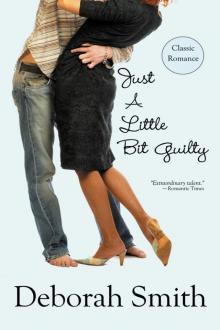 Just a Little Bit Guilty
Just a Little Bit Guilty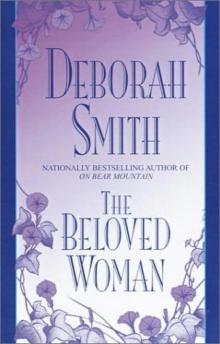 The Beloved Woman
The Beloved Woman Alice At Heart
Alice At Heart Heart of the Dragon
Heart of the Dragon Critters of Mossy Creek
Critters of Mossy Creek Diary of a Radical Mermaid
Diary of a Radical Mermaid Caught by Surprise
Caught by Surprise Stranger in Camelot
Stranger in Camelot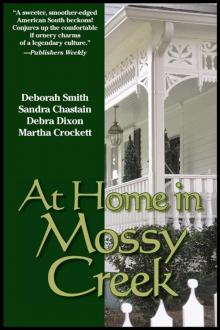 At Home in Mossy Creek
At Home in Mossy Creek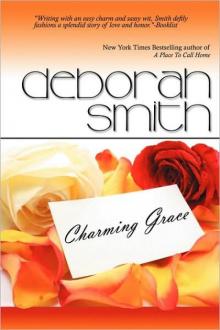 Charming Grace
Charming Grace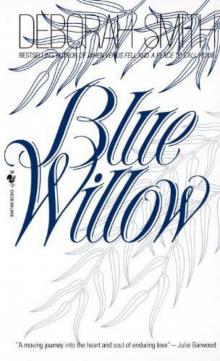 Blue Willow
Blue Willow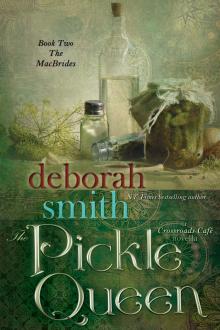 The Pickle Queen: A Crossroads Café Novella
The Pickle Queen: A Crossroads Café Novella On Bear Mountain
On Bear Mountain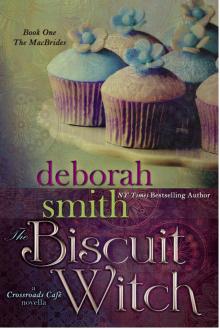 The Biscuit Witch
The Biscuit Witch Sara's Surprise
Sara's Surprise More Sweet Tea
More Sweet Tea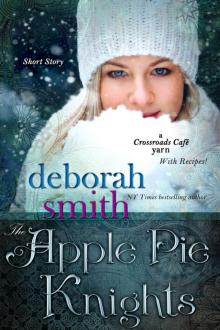 The Apple Pie Knights
The Apple Pie Knights The Silver Fox and the Red-Hot Dove
The Silver Fox and the Red-Hot Dove Sweet Hush
Sweet Hush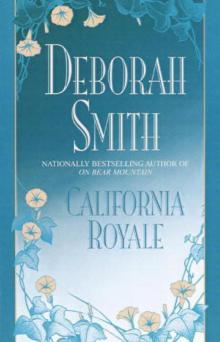 California Royale
California Royale Hot Touch
Hot Touch Miracle
Miracle The Stone Flower Garden
The Stone Flower Garden A Place to Call Home
A Place to Call Home Silk and Stone
Silk and Stone Honey and Smoke
Honey and Smoke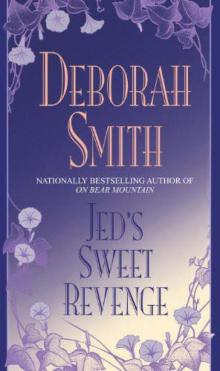 Jed's Sweet Revenge
Jed's Sweet Revenge Silver Fox and Red Hot Dove
Silver Fox and Red Hot Dove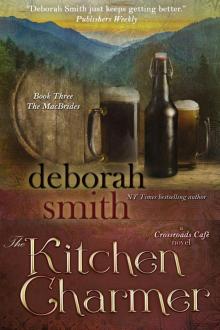 The Kitchen Charmer
The Kitchen Charmer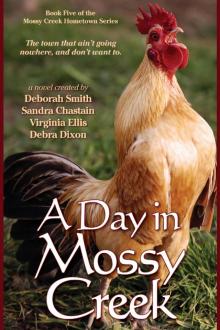 A Day in Mossy Creek
A Day in Mossy Creek Never Let Go
Never Let Go Summer in Mossy Creek
Summer in Mossy Creek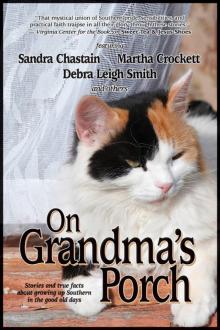 On Grandma's Porch
On Grandma's Porch The Crossroads Cafe
The Crossroads Cafe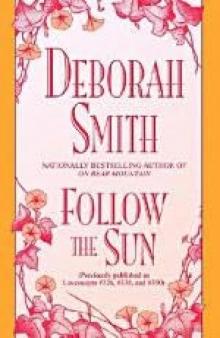 Follow the Sun
Follow the Sun The Yarn Spinner
The Yarn Spinner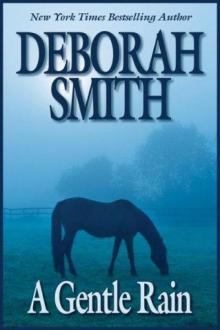 A Gentle Rain
A Gentle Rain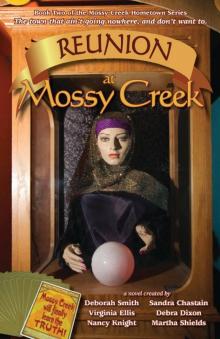 Reunion at Mossy Creek
Reunion at Mossy Creek